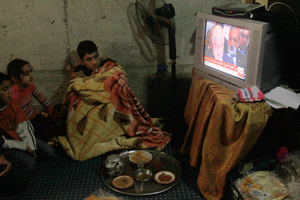GENEVA — A UN envoy met members of Syria’s opposition in Geneva on Thursday, Jan. 23, as efforts began to salvage peace talks by focusing on local ceasefires and prisoner swaps rather than a political deal.
The first day of talks on Wednesday was dominated by fierce rhetoric from President Bashar al-Assad’s government and its foes. Brought together for the first time in almost three years of war, each accused the other of atrocities and showed no sign of compromise.
UN envoy Lakhdar Brahimi met leaders of the Syrian opposition at a Geneva hotel to discuss the agenda for further talks on Friday. The opposition then went to meet officials from the United States, France and Britain.
Officials still hope they can salvage the process by starting with more modest, practical measures to ease the plight of millions of people on the ground, especially in areas cut off from international aid.
Humanitarian efforts
More than 130,000 people are believed to have been killed, nearly a third of Syria’s 22 million people have been driven from their homes and half are in need of international aid, including hundreds of thousands in areas cut off by fighting.

|
| Syrian refugees watch the Geneva-2 peace conference on television at the port city of Sidon, southern Lebanon January 22, 2014. Syria’s government and its enemies came face to face for the first time on Wednesday at a one-day peace conference in Switzerland which world powers hope can at least start a process to end three years of civil war. REUTERS/Ali Hashisho |
The UN humanitarian chief said the international body hoped political talks between the warring sides in Syria would clinch local ceasefires to allow vital food and medicines to reach millions of civilians.
“I have discussed this with Mr. Brahimi and he’ll continue to push this. Because political negotiations can take a very long time. And as we saw yesterday, there are big differences between the parties,” Valerie Amos said in an interview with Reuters on Thursday.
“But if we are able to get a major push on getting into these communities, it would make a significant difference.”
She said it was crucial to gain access to some 250,000 people trapped in besieged communities, many of them in Aleppo, Homs and near Damascus, who have been out of reach for many months. Some say they have been reduced to eating grass in order to avoid starvation.
Another 2.5 million people are in “hard-to-reach” areas, having received UN relief supplies just once or so, Amos said.
“The key issue for us is that control of communities shifts all the time. We want to really take advantage when there is a sense we can move very quickly to try to do that,” she said
Sides disagree over discussing Assad’s fate
Wednesday’s opening ceremony saw global powers vigorously defend their sides, with Western countries, Arab states and Turkey all joining the opposition in demanding a transitional government that would exclude Assad.
Russia, his main global supporter, said the focus of talks should be on fighting “terrorism”, a word the Syrian government applies to all of its armed opponents.
In the most dramatic moment of the conference, Assad’s foreign minister accused opposition fighters of raping dead women, killing foetuses and eating human organs, drawing a rebuke from U.N. Secretary-General Ban Ki-moon for using inflammatory language.
Foreign Minister Walid al-Moualem also dismissed any suggestion that Assad might leave power, saying no international forum had the right to question the president’s legitimacy. Western and Arab states declared Assad must go.
The main negotiations, expected to last up to a week, are not due to begin until Friday, giving mediators a day to lower the temperature and focus on pragmatic steps.
One of the opposition negotiators, Haitham al-Maleh, said the mood was positive despite the tough first day. He spoke of a two-stage process, with practical steps like prisoner swaps, ceasefires, the withdrawal of heavy weapons and setting up aid corridors being dealt with first, before talks of a political future.
The talks remain fragile, however, with both sides threatening to pull out – the government says it will not discuss removing Assad, while the opposition says it will not stay unless Assad’s removal is the basis for talks.
“There is an international willingness for this to succeed, but we don’t know what will happen,” Maleh said. “It is possible that (the government) might withdraw. We will withdraw if Geneva takes another course and deviates from the transition, to the government narrative that they are fighting terrorism.”
Russian Foreign Minister Sergei Lavrov played down the contentious speeches that opened the talks, and emphasized the positive: “As expected, the sides came up with rather emotional rhetoric. They blamed one another,” he told reporters.
“For the first time in three years of bloody conflict … the sides – for all their accusations – agreed to sit down at the negotiating table.”
French Foreign Minister Laurent Fabius, one of the staunchest backers of the opposition, said: “Hope exists, but it’s fragile. We must continue because the solution to this terrible Syrian conflict is political and needs us to continue discussions.”
Among the many difficulties with the process, the opposition delegation does not include the al Qaeda-linked Islamist militant groups who control much of the territory in rebel hands and have denounced those attending the talks as traitors.
Rebel ranks have been divided, with hundreds killed in recent weeks in battles between rival factions and the al-Qaeda-linked Islamic State of Iraq and the Levant. Al-Qaeda leader Ayman al-Zawahri called on fighters to unite.
— Reuters, Al-Akhbar, TAAN






Leave a Reply